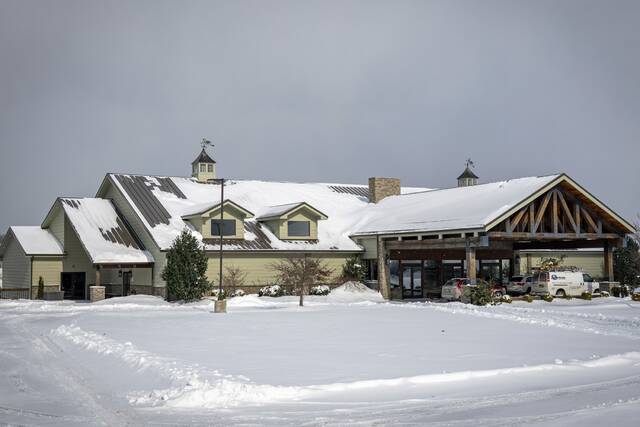The fate of a residential tax assessment appeal program in the Hempfield Area School District could be in question as newly elected board members who have mostly voiced opposition to the practice take their seats.
More than two years into a residential tax assessment appeal program, the district is bringing in an additional $6,700 after law firm officials implemented tax hikes on four residential properties. Four more properties in the program could increase that amount to more than $18,000.
The goal of the program is to raise property taxes to what they would be today if officials did a county-wide reassessment — something that has not been done since 1973. The process has been controversial across the township since 2017, when a Pennsylvania Supreme Court ruling added residential properties to the program, which was adopted by the district in 2015 and originally targeted only commercial and industrial parcels. Assessments for the district are done by Forest Hills-based attorneys Andrews & Price.
In an attempt to ease tensions among residents, school board members voted last year to change the differential — the difference between the fair market value and selling price of a property — from $100,000 to $250,000. That decision caused 28 properties to be removed from the program during the 2019 tax year, district business manager Wayne Wismar said.
But some board members still have questions about the impacts the process could have on development in the area and whether the tax assessment appeal program is the best system moving forward. The board is holding a special meeting Monday to discuss the process with the law firm.
“There are more questions than answers,” member Mike Alfery said. “In my opinion, it’s a flawed system. I haven’t seen any information yet to prove to me it’s not a spot assessment scenario. I’m not sure Andrews & Price is the answer to oversee the process.
“Although it is complex, I’m confident we can find the answers. It needs to be understood by the board and explained properly to the taxpayers.”
Mathematical formula
Looking to put his Lady Smith Road home on the market soon, Hempfield resident Dan Parise knows one thing — he plans on lowering the sale price despite over $480,000 worth of upgrades he said he’s put into the property.
Parise said he purchased the home in 2002 for $198,500. However, in order to keep potential buyers from being hit with a tax hike, he could not sell the home for over $399,500, he said.
“The next person is going to end up paying more in taxes. … I’m now going to have to lower my selling point so I’m not scaring any potential buyers out,” he said.
According to Wismar, all properties sold from July of the previous year to July of the current year are looked at by Andrews & Price through the Westmoreland County Recorder of Deeds website.
The law firm did not return calls for comment.
From there, officials use the Westmoreland GIS site to calculate a property’s fair market value, which is done by adding the land value to the improved value. That number is then calculated for inflation and subtracted from the price the property sold for, said Beth Stabile, deputy chief assessor with the county.
“It’s a mathematical formula. I mean, it really is. They’re plugging in numbers based on the information they get from the sale,” Superintendent Tammy Wolicki said, adding that the program carried over from year to year after the original vote in 2015. Another vote wasn’t required until the board increased the differential, she said.
For Mount Thor Road resident Dana Smith, however, the issue comes in with properties that met the criteria but were sold prior to the Supreme Court case involving a King of Prussia apartment complex.
According to Smith, it is unfair to not include residential properties sold between July 2015 and July 2016.
Wolicki replied that when the court ruling occurred, school districts had to implement the process immediately rather than look back at previous years.
State Rep. Eric Nelson, R-Hempfield, agreed with Smith, however, adding that the process is unfair to seniors, farmers and new construction. He has vocally opposed the process by calling it a “money grab.”
“Just because it hasn’t been challenged in court doesn’t make it right,” Nelson said. “They are treating one neighbor differently from another, and it’s wrong on the most basic level. And it’s all over money.”
To make it fair, Nelson said the school board should have Andrews & Price look into properties that are over-assessed, which would lower a property owner’s tax rate. Right now, property owners have the ability to challenge their tax rates if they feel they are paying too much.
According to Wismar, the district lost more than $100,725 in 2019 tax revenues because of appeals by property owners that led to reversals.
“We as a governing body of the district, we are not out there assessing,” board member Sonya Brajdic said. “That’s not our job. … But it is our job to try and get the fair value into our district so we are not raising taxes to a value we wouldn’t have to. It is our financial duty to do this.”
Nelson said several state representatives are working to eliminate property taxes and to implement a new plan. In June, Rep. Pam Snyder, D-Carmichaels, along with state Reps. Marcia Hahn, R-Northampton, and Rosemary M. Brown, R-Monroe, introduced a bill that would enable districts to exclude up to 100% of a homeowner’s school property tax bill.
Rep. Eddie Day Pashinski, D-Luzerne, recently announced a school property tax relief rebate bill that would give an $800 rebate for taxpayers, and a $50 rebate for renters, funded through a 3.49% personal income tax increase and an expanded sales tax on certain luxury items and services.
Western Pa. tax assessments
Westmoreland County is not the first Western Pennsylvania area to have issues with tax assessment appeals.
In 2012, a county-wide reassessment was done in Allegheny County — a decision that evened out a property’s assessed value versus its selling point and cost the county $9.3 million.
Before Allegheny, Washington County proceeded with a court-ordered reassessment after Washington and McGuffey school districts sued to force the reassessment. County commissioners fought back, eventually appealing the lawsuit to the state Supreme Court and losing in 2013.
The reassessment cost the county $7 million.
Commissioners in Indiana and Blair counties decided on their own to start reassessments. Indiana had not had a reassessment since 1968, while the last one in Blair County was in 1958.
In Westmoreland, five school districts use Andrews & Price for tax assessment appeals: Burrell, Greater Latrobe, Greensburg Salem, Norwin and Hempfield. Washington County districts California, Canon-McMillan and McGuffey also use the law firm, Wolicki said.
A board divided
Despite several Hempfield board members voting in July to carry the program over into the coming tax year, members Scott Learn, Paul Ward and Alfery voted against the decision.
“I didn’t care for the uncertainty, the completeness that we were getting reported on and how Andrews & Price was handling it,” Learn said.
Ward said board members are waiting on Andrews & Price to address concerns, including the implications the process has on the community. He declined to go into further details about other questions he has for the law firm.
Newly appointed members Tony Bompiani, Jennifer Bretz and Vince DeAugustine are against the program, a point most of them made the focus of their campaign.
Bretz, who hopes to end the tax assessment appeals process on residential properties, said, “Residents, Realtors, developers and elected officials all spoke out against the reassessment policy last year, and the board acted only to change the reassessment threshold, which they could have changed back again at any time.”
She added that the process discourages development and residential sales. DeAugustine agrees.
DeAugustine, who referred to the practice as spot assessments — a violation of the state constitution — said a decision for new board members will boil down to Monday’s meeting with Andrews & Price. He added that tax assessment appeals are a deterrent for new home buyers.
“I want to see the school district do everything in its power to attract new people to the area, not deter them,” he said. “This appeals process scares people, and I don’t blame them.”
Diane Ciabattoni and Brajdic, along with Jeanne Smith, who was recently reelected, have previously voted in favor of continuing the program. They say tax assessment appeals are a way for the school board to ensure residents are paying their fair share.
“I don’t want to hurt anybody, but I do want to help the average taxpayer who is paying the full amount for their taxes,” Ciabattoni said.








